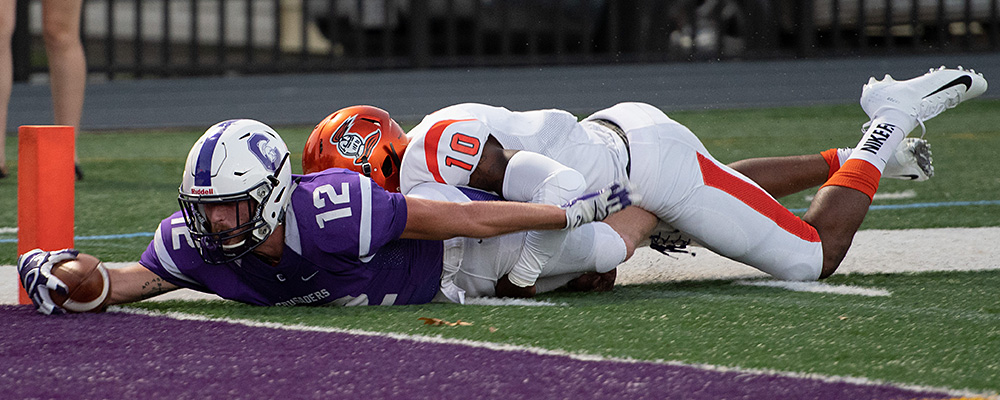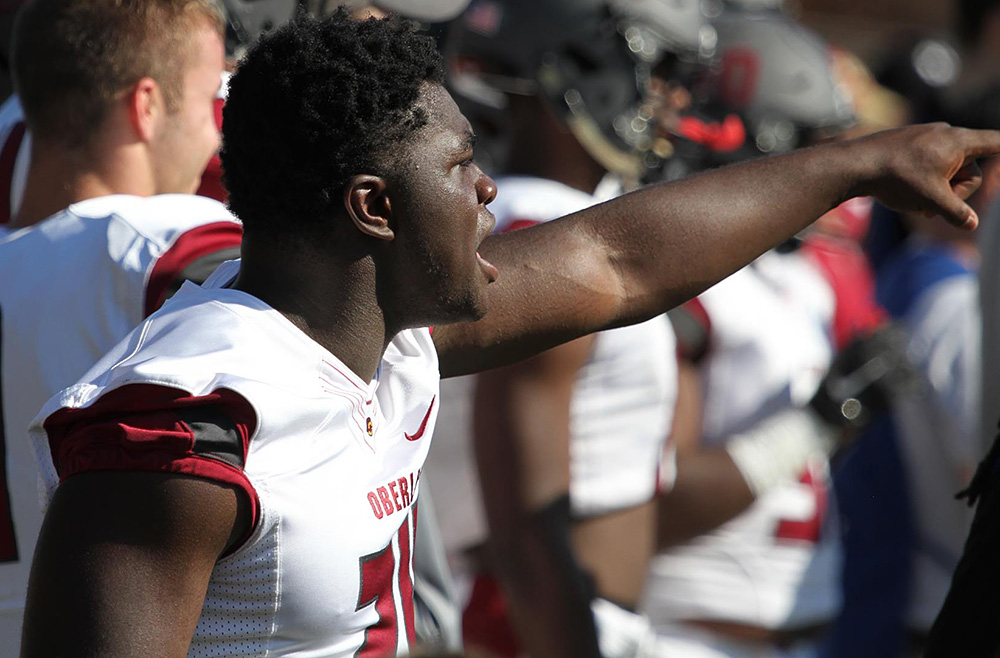
|
| Wyatt Pertuset is brought down short of the goal line against Heidelberg, but had already put himself in the scoring column two weeks earlier. Capital athletics photo by Spencer Dilyard |
By Adam Turer
D3sports.com
Being a college football player is tough. It takes a special kind of physical and mental strength.
Being a 17- to 22-year-old male is tough. It takes a certain mental and emotional strength.
Football has a long history of being a masculine sport, sometimes to the detriment of those who love the game the most.
Nearly every single player who has stepped onto a football field has played through some kind of pain. Often, that pain is physical and manifests itself in the form of a nagging muscle strain from running or an aching shoulder or forearm from contributing to a collision. Just about every football player has kept an injury to himself, rather than reporting it to his coaches or training staff.
But there are other challenges that players often internalize that have nothing to do with physical pain. The current generation of college football players is doing its part to effect change, remove stigmas, and ensure that the masculinity surrounding football is healthier than ever before.
With 36 seconds to play in the first quarter of the 2018 season opener, Wyatt Pertuset caught a 37-yard touchdown pass from Thomas Wibbeler. The score gave the Crusaders a 13-12 lead over Mount St. Joseph. The score meant so much more to so many.
With that play, Pertuset achieved his goal to be the first openly gay college football player to score a touchdown.

|
| Acceptance has never been a problem for Wyatt Pertuset with his Capital football teammates. Capital athletics photo by Jamie Gaffney |
“I think it was a big moment for everyone. Just the fact that it was his first touchdown in his career is the first thing that popped into my head,” said Wibbeler. “The fact that he’s the first gay receiver is something to be proud about. The team celebrated Wyatt for who he is and for scoring his first touchdown.”
Since the play has been featured on outsports.com, ESPN, and Capital’s student newspaper, Pertuset has received an outpouring of feedback and support. Some messages have come from current high school athletes who see Pertuset as a beacon of hope. Even more messages have come from former football players who wished they had been out while they played.
“There have been quite a few high school players from a variety of sports who have come to me for advice or just to thank me and that’s really great. I’m truly thankful for all of those messages,” said Pertuset. “I probably get more messages from former players than from high school athletes. It’s incredible to hear their stories and what they have to say. I’m just really thankful that they’re supportive of me and thankful for the opportunity to do things that maybe they couldn’t do or wish they could have done.”
When Chris Rinere was a freshman football player at St. John Fisher in 2004, he was uncomfortable. The inside linebacker knew he was gay, but as a football player at a Catholic institution, coming out publicly was something that he did not even consider.
“I wasn’t comfortable and didn’t want to be thrust into a situation where people figured out my orientation, so I kind of just hid,” said Rinere. “As you see and hear stories about people being more comfortable now and people around them being more comfortable, I think there is a difference in acceptance now.”
Pertuset is a shining example that a gay man can play what most consider to be a masculine sport at a high level and be accepted by his teammates and coaches. Sexual orientation does not impact a player’s ability to play football, although many gay men feel an anxiety about coming out to their team.
“I wasn’t comfortable and didn’t want to be thrust into a situation where people figured out my orientation, so I kind of just hid. As you see and hear stories about people being more comfortable now and people around them being more comfortable, I think there is a difference in acceptance now.”- Chris Rinere, who played at St. John Fisher |
Anxiety itself should not be a hindrance for a football player. The more comfortable players feel in their own skin, the better they can play on the field.
“I can fully attest to this as an athlete, if you’re not comfortable in what you’re doing on the field, your performance will be impacted and you won’t do very well,” said Rinere. “It’s good that the conversations are happening, that players and coaches are starting to feel more comfortable. There needs to be more. These conversations need to keep happening, especially on a larger scale. It would be nice to hear more stories in Division I and in the professional ranks.”
Khalid McCalla is a sophomore linebacker at Oberlin. He recently wrote a column for his school’s newspaper in which he explored the topic of football and masculinity. The movement to change the way football frames masculinity begins with voices like McCalla’s sharing their thoughts and vulnerability with the masses. McCalla was inspired to write about masculinity and its relationship with the football community in part by the recent death by suicide of Wabash linebacker Evan Hansen. Football players struggle just as much as their non-football playing peers. But the culture of next-man-up doesn’t allow much time or room for struggle or perceived weakness.

|
| Khalid McCalla points out something to Oberlin teammates. 2017 Oberlin athletics file photo |
“Masculinity is something that will never go away. I think that, in today's world, it is more socially acceptable to explore what being ‘masculine’ really means, but it still isn't something that is being encouraged or supported as much as it should. For the most part, people are still holding on to more traditional views of masculinity,” said McCalla.
Pertuset was worried about what his small rural town in Ohio would think if his teammates, coaches, and teachers found out he was gay. He waited until his junior year of high school before openly coming out to everyone. The support he received was surprisingly overwhelming. The leadership from his coaches went a long way to ensuring that his teammates remained supportive.
“They all took it way better than I thought they would, coaches included,” he said. “My coaches told people if they had a problem with me, they’d be removed from the team.”
His senior year at North Union High School was the best of his life on and off the field. He earned special mention All-State honors following the season. There was momentary trepidation when he arrived on Capital’s campus and Pertuset briefly considered keeping his truth to himself. But his teammates, some who knew him from high school, quickly dispelled any fears.
“It was pretty intimidating to me at first,” he said. “Everyone was cool about it and everyone accepted me as family.”
“In the locker room, Wyatt’s just one of the guys and everyone treats him with respect,” said Wibbeler. “We just treat him as part of our football family. We just go through our business and work hard. He’s one of the hardest workers on our team.”
The Crusaders were thrilled for Pertuset to score his first collegiate touchdown, but not so much because of its cultural significance. After a promising freshman year in which he saw some action at wide receiver and stepped up as the team’s starting punter, Pertuset injured his foot during the team’s intrasquad scrimmage as a sophomore and missed the entire season while enduring two surgeries. Pertuset’s masculinity was never doubted by his teammates.
“I don’t understand why the LGBT community can’t be masculine. I think Wyatt is a pretty masculine guy and that doesn’t affect how he plays football,” said Wibbeler.
Like he did in high school, Pertuset lets his effort on the field quiet any preconceived notions that outsiders may have about whether an openly gay man can excel as a football player.
“The masculinity in football – from a physical standpoint it definitely has to have that. This game really isn’t for nice people.”- Capital football player Wyatt Pertuset |
“The masculinity in football – from a physical standpoint it definitely has to have that. This game really isn’t for nice people,” he said. “You have to have that intimidating factor about you. Just being myself and being the hard-working player that I am, I just play the game and don’t think about that too much.”
That mindset often leads football players to confuse their on-field persona with any off-field issues they may be experiencing. There is an inherent contradiction, one that Rinere felt sharply 14 years ago.
“You’re almost two different people when you play this sport. You have to be a beast on the field, but you also need to separate that off the field,” said Rinere. “Football is one of those sports that has a very polarizing mindset in that regard. When you grow up playing, it’s always about being stronger and showing weakness is not something you ever want people to be aware about. It’s hard to share something about yourself, especially something that has historically been used in a derogatory sense as weaker.”
The conversations that Pertuset had with his high school teammates and coaches, then his Capital teammates and coaches have been crucial. He still loves the game that he started playing in second grade. Players who are struggling with personal issues should be encouraged to speak up, not to shy away for fear of being perceived as weak. Without the open dialogue, Pertuset would not be thriving as he has been this season.
“I think the first step is to just get people talking. Coaches and players have this really intimate relationship that isn't as conducive to discussion as it should be,” said McCalla. “Once players are comfortable talking about more sensitive subjects with their coaches, and once coaches are more comfortable hearing players out, then I think we'll be headed in the right direction.”
Players’ Corner
This season, Around the Nation wants to spotlight players who have faced adversity while playing Division III football. As mentioned in the first column of this season, we all face challenges just to play D-III football. Some face more than others.
Like Pertuset, McCalla also had an injury setback. As a freshman from Atlanta in his first year on campus in Ohio, the injury presented a multitude of challenges. The support from his teammates inspired McCalla to persevere.
The most adversity I've personally faced was definitely injuring my shoulder and the subsequent recovery from that injury. It was the first time in my life I needed surgery and having it nearly a thousand miles away from home made it pretty difficult. My teammates were there for me through the whole thing. I remember when I came to after surgery I had messages from nearly half the team already.
If you or someone you know has a story of overcoming and would like to be featured in Players’ Corner this year, please reach out to me at any time.
What do you know? Do you know things? Let's find out!
There are so many worthy stories to be told and I can’t find them all on my own. Please share with me those stories that make you passionate about Division III football. If you have suggestions for next week's column, please reach out to me on Twitter at @adamturer or via email at adam.turer@d3sports.com. Thanks for reading!








